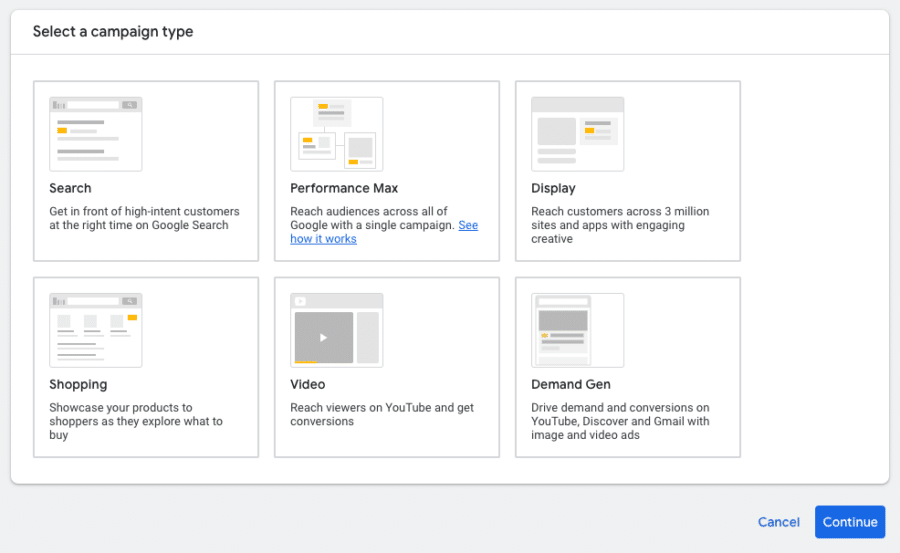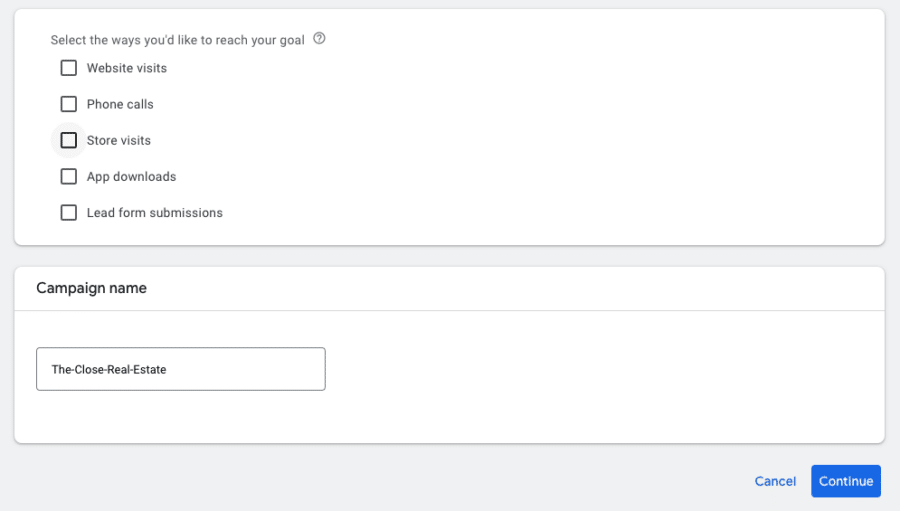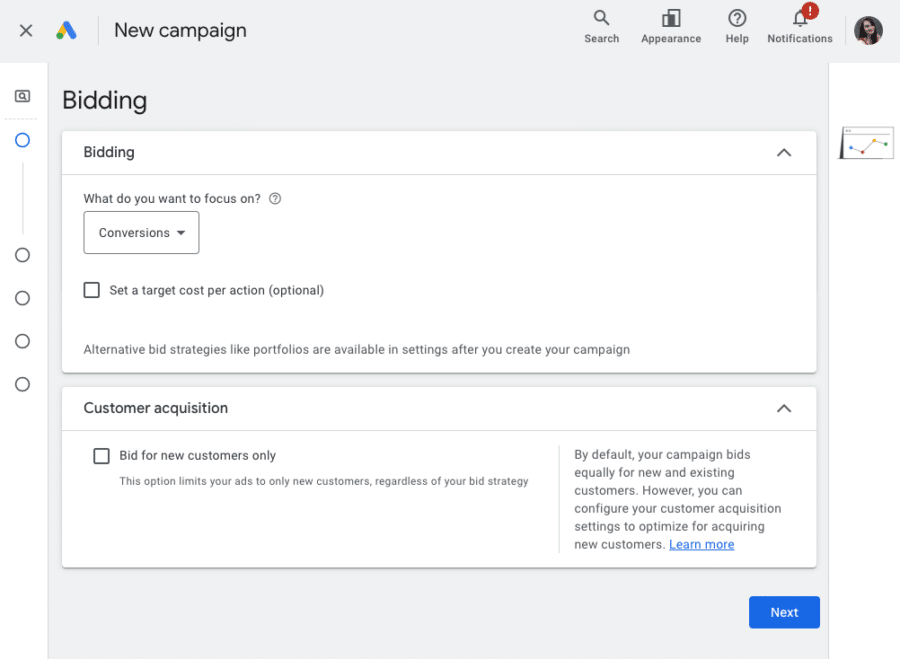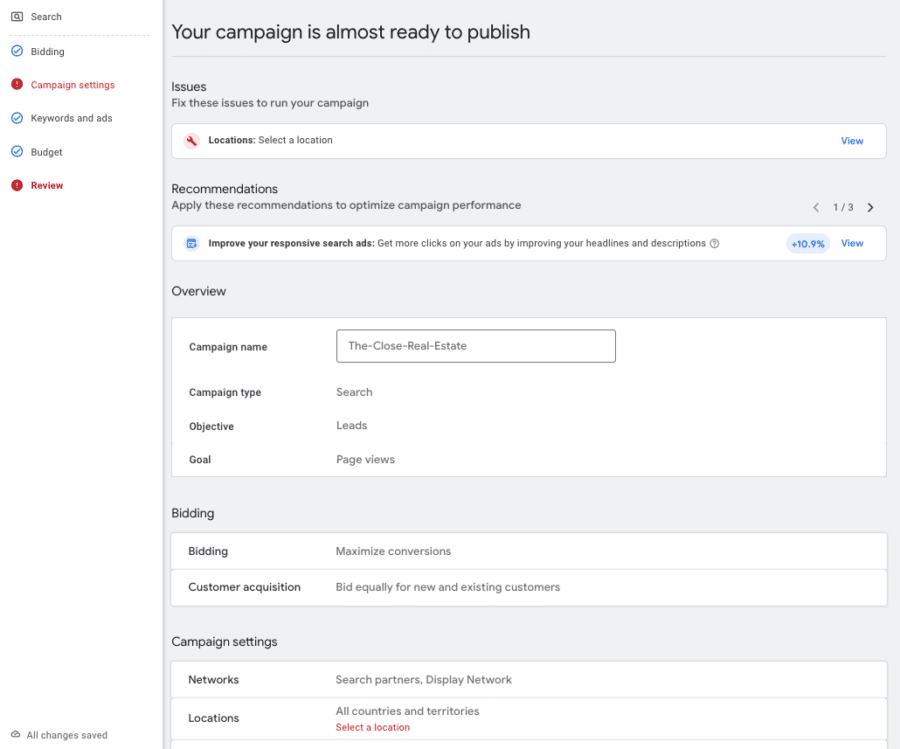Digital marketing has become a key part of running a real estate business, but many agents still have questions and concerns about advertising. Google Ads can be confusing for agents but are also incredibly impactful because they target buyers and sellers actively searching for real estate answers. I’ll dive into everything you’ve wondered about using Google Ads for real estate, including how they work, average costs, benefits, the best strategies, and a step-by-step guide to creating your first campaign.
What Are Real Estate Google Ads?
Google Ads, a real estate marketing strategy, help agents generate leads and build brand recognition. These ads target potential clients actively searching for real estate-related content online, making them more likely to convert into clients.
There are many different types, but these are the most relevant types of Google Ads for realtors:
- Search ads: These ads, also known as pay-per-click (PPC) ads, appear within Google search results. They are the most common type of real estate Google Ads.
- Display ads: Google shows these ads to your target audience but not directly in search results. Instead, they are shown in image form across millions of different websites, such as blogs, news websites, and social media.
- Video ads: Since Google owns YouTube, video ads are shown before, during, and after YouTube videos.
- Local services ads: These ads appear in search results, specifically for searches for realtors or real estate agents. Local service ads are valuable because they are connected to your Google Business profile.

How Google Ads Work for Real Estate Agents
Understanding the general process and benefits of any real estate lead generation strategy is crucial before investing your time and money. I’ll go through the step-by-step process of creating a Google Ads campaign below, but in general, the ideal process for real estate Google Ads looks like this:
- Keyword search: User searches for a real estate-related keyword.
- Interaction with ad: The user clicks on your ad (in Google or on a different website).
- Redirect to a landing page: User goes to a targeted landing page where they find what they’re searching for (real estate services) and input their contact information.
- Lead follow-up: The real estate agent follows up to nurture and convert the new lead.

This process is similar to the strategy for other real estate ads, such as social media or Facebook ads. For various specific ideas and examples, read 28 Clever Real Estate Ads: Real Examples (+ Why They Work).
Benefits of Google Ads for Real Estate Agents
If you’re ready to invest in your business, it’s reasonable to weigh the pros and cons of using Google Ads vs one of the many well-known real estate lead generation companies. One of the main benefits of Google Ads for real estate agents is that this strategy uniquely targets local users actively seeking answers to their real estate questions. This benefit makes this strategy’s potential return on investment (ROI) extremely high.
A few of the other benefits of Google Ads for realtors include the following:
| Wide audience reach | Google has an average market share of 81.95% among search engines, which means that the vast majority of users start and end their searches with Google. Research shows that 63% of people have clicked on a Google ad |
| Affordable | Google Ads are relatively inexpensive compared with other advertising strategies. The average cost-per-click (CPC) of Google Ads in real estate is only $2.37, which is lower than the average of $2.69 across all industries. |
| Highly measurable | Digital ads are easy to measure, and Google provides detailed analytics for every website and ad campaign. |
| Targeting | Google provides incredibly advanced targeting capabilities, so your ad campaigns will be displayed for a specific type of lead or client. This targeting keeps costs down, maximizes ROI, and makes every ad extremely effective. |
| Quick lead conversion | Targeting leads who are actively searching for real estate help makes it much easier to connect with them quickly. Google Ads have an incredibly average ROI of 8 to 1. |
How to Set Up a Google Ads Campaign
First, you must have a Google Ads account to create your first campaign. You can easily create one with your existing Google account or create a new Google account for your business. Then, click “Start Now” from the Google Ads homepage and follow the prompts.
Let’s create your first Google Ads campaign and choose the proper settings. Click through the images to get more details.
Real Estate Google Ads Strategies to Use
It’s clear that Google Ads can be incredibly powerful for real estate professionals, but they must be done correctly to get the maximum benefit. You can’t take a “set-it-and-forget-it” approach—you have to start with a strong strategy and continually adjust and improve it. Here are a few of the most important tips for creating effective Google Ads for real estate.
Strategy 1: Consider Working with a Professional
Setting up and managing an online ad campaign can be intimidating. While anyone can learn how to be successful with Google Ads, there will definitely be challenges and a steep learning curve if you’ve never done digital marketing. If you are convinced that Google Ads are a good strategy for you but are not confident in your skills, having guidance through the process might be the best option.
Google offers one-on-one consultations to help you manage your ads. If your business is already generating income, outsourcing your ad to a specialist might be the best way to see results quickly.

Strategy 2: Define your Target Customer for Each Campaign
Defining your audience is essential for every lead generation strategy, not just online ads. However, it’s also a technical part of the process for both real estate Facebook ads and Google Ads. Google calls this your “audience segment” (formerly “audience type”), and there are a few specific ways that Google uses this information to target your ideal audience.
Here are some of Google’s audience segment categories:
- Location: Targeting users by location is particularly important for real estate agents because you don’t want to waste your money advertising to users in a different state.
- Affinity: This segment evaluates user behavior across the internet and shows your ads to those searching for or engaging with related content. This affinity is an essential element in predictive analytics that has proven incredibly effective.
- Detailed Demographics: You can target your audience by age, education, homeownership status, gender, or more. However, real estate agents must consider fair housing laws because discriminating against a protected class is illegal.
- Your data segments (formerly known as “remarketing”): This strategy uses data from your website or other pages to advertise continually to users who have already interacted with your website in some capacity.
- Life events: Google allows advertisers to target users during specific life events, such as divorce, relocation, or marriage. This targeting is a great way to get real estate listings in niche audiences.
- Custom segments: If none of the existing segments fit your ad campaign well enough, you can add relevant real estate keywords, website URLs, or even apps to create a custom targeting strategy.
Strategy 3: Do Thorough Keyword Research
As a search engine, keywords are the heart and soul of any marketing with Google. The success of your Google Ads for real estate will depend on the quality of the keywords you choose—don’t let anyone tell you that it is as simple as advertising with keywords like “[city] real estate.”
Start by researching various keyword options. Use Google’s free Keyword Planner, although paid tools like Semrush offer more detailed information. A few of the most important considerations for keywords include the following:
- Search volume: Look up how often each keyword is searched. If you find a perfect keyword but it doesn’t have any search volume data, then it’s probably not a good fit for your ads.
- Competition: Evaluate the competitiveness of each potential keyword. Many keywords have a high search volume, but if they’re highly competitive, you’ll spend more on advertising and get fewer leads.
- Search intent: Consider what each user looks for when they type specific keywords. For example, “What is my Fort Worth home worth” and “Fort Worth homes for sale” are both real estate-related keywords, but they look for significantly different things. Ensure you advertise using keywords with precise ad copy and landing pages.
- Long-tail keywords: Keyword phrases with three to five words are typically more targeted and better options for real estate Google Ads. For example, targeting “Shadyside Pittsburgh 3 bedroom houses” will be better than “Pittsburgh real estate.”
- Negative keywords: It’s vital to specify terms you do not want to rank for because this is an easy way to waste your ad spend. For example, “Buffalo real estate” could be displayed to New York, Oklahoma, and Texas residents if you don’t clarify your geographic location.
Strategy 4: Optimize Your Landing Pages & Website
Your work is not done after setting up the ad campaign itself—you have to ensure that the ad leads people to the information they are actually looking for. In fact, this is an important part of how Google views your ad and the “quality score” it gives your campaign.

Ensure your ads take users to a landing page that is highly relevant to what they’re searching for, visually appealing, and functional. Don’t forget to include a lead capture form to start nurturing your new leads!

The most efficient way to quickly create a functional, professional, and effective landing page is by using a real estate website builder. For example, Placester has an incredibly easy-to-use platform to create custom landing pages without touching any code. Plus, you can try it free for 30 days!
Strategy 5: Consistently Measure Your Ad Performance
Once your ad is up and running, gather data to track its performance. This information should reveal how users interact with your ad and website, which helps you continually adjust and improve your ad campaign.
Learning how to track the performance of your real estate Google Ads is crucial for optimizing your ad and maximizing your ROI, but there may be a learning curve. Start by defining your key performance indicators (KPIs) to understand your ad’s performance better.
Here are some important KPIs to pay attention to:
- Impressions: These are the number of people who see your ad in search results. While these don’t provide enough insight into your ad’s effectiveness on its own, they are a good benchmark for evaluating the overall reach of your campaign.
- Click-Through Rate (CTR): This is the percentage of people who click on your ad after seeing it. The average CTR for real estate ads is around 3.71%.
- CPC: This measures the average price you pay for each click on your ad. The average CPC for real estate ads is $2.37, although it can vary significantly.
- Conversion Rate: To measure your conversion rate, you must define an action that counts as a “conversion,” such as filling out a home valuation or clicking a link. Conversion rates vary widely because the actions differ, but one study found the average real estate conversion rate for Google Ads to be 2.47%.
- Cost-Per-Action (CPA): Similar to the conversion rate, this is how much it costs to generate a new lead from your Google ad. The average CPA in the real estate industry is $116.61.
- Return on Ad Spend (ROAS): This is what most agents ultimately care about: the revenue generated for every dollar you spend on your ad. You can calculate this in a few ways, usually by combining your CPC and CPA. It’s ideal to aim for a ROAS of around 300%.
FAQs
Are Google Ads effective for real estate agents?
Yes, Google Ads can be highly effective for real estate agents. They have been known to have an ROI of 8 to 1. Plus, the advanced targeting options and various types and strategies of Google Ads help real estate agents reach their ideal audience effectively and affordably.
How much does Google Ads cost per lead for real estate?
The cost of Google Ads for real estate varies significantly based on your keywords, strategies, and the parameters you measure. However, according to a detailed WordStream study, the average CPC is $2.37, and the average CPA or cost per lead is $111.61.
Are Facebook ads or Google Ads better for real estate?
Facebook ads and Google Ads have specific benefits for realtors, like advanced targeting capabilities, the ability to set your budget, and the ability to measure their performance. However, Google Ads target users searching for specific answers, and real estate Facebook ads target your audience on social media.
Bringing It All Together
Google Ads require a strong strategy, thorough keyword research, and the ability to analyze data. However, the right tips can be a potent tool for real estate agents to increase their reach, generate targeted real estate leads, and build brand recognition.






















Add comment